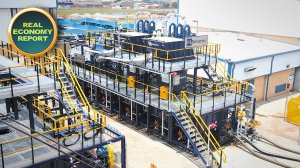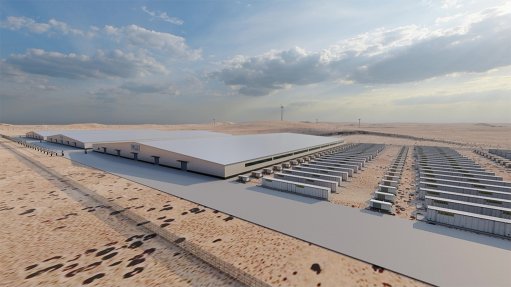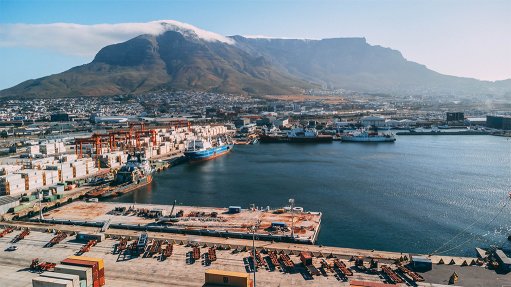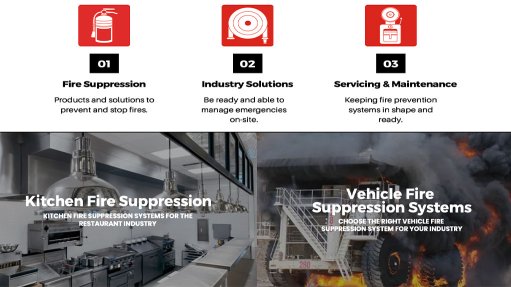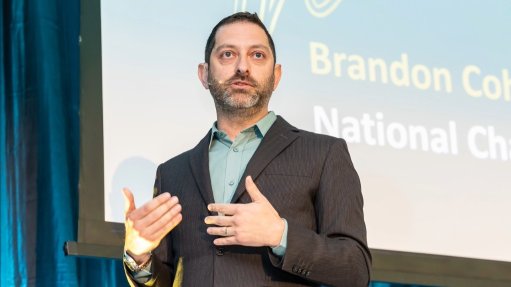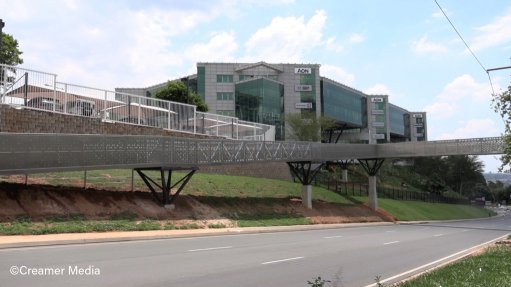FLSmidth launches new, modular Reflux Classifier plant
From Creamer Media in Johannesburg, this is the Real Economy Report.
Sashnee Moodley:
Minerals and cement industry equipment and services supplier FLSmidth has officially launched its modular Reflux Classifier plant, which is suitable for fines gravity separation applications. Mia Breytenbach has the details.
Mia Breytenbach:
The modular Reflux Classifier (RC) plant is an integrated engineered solution and is based on a fundamental component – FLSmidth’s well-proven RC technology. This technology improves the performance of gravity separation circuits, compared with existing technologies, such as spirals and hydrosizers. FLSmidth country head and Minerals sub-Saharan Africa VP Deon de Kock tells us more.
FLSmidth country head and Minerals sub-Saharan Africa VP Deon de Kock:
The reflux classifier technology was invented by Professor Galvin of the University of Newcastle in Australia and FLSmidth joined hands with them to commercialise the technology.
Subsequently we have also patented many of the designs that went with it and the reflux classifier technology is really about fines beneficiation.
Wherever you have chrome or wherever you have platinum, manganese or iron-ore and coal, this reflux classifier technology is used for the fines beneficiation.
It is based on dense media separation, it is combined with a lamella plate design, which is unique to the reflux classifier and therefore it enables you to really recover the valuable material that you have in your processing plant.
Mia Breytenbach:
The reflux classifier comprises the lamella settler, the autogenous dense-medium separation, and the fluidised bed separator.
Plant components include tanks, cyclones, FLSmidth Krebs pumps, Krebs Tech-Taylor valves, Technegate valves, the FLSmidth Ludowici vibrating screen, the Reflux Classifier, dewatering equipment, as well as the Meshcape Screen Media that comprises the polyurethane screen panels.
The plant is also fitted with a lightning protection system for optimum safety.
The FLSmidth equipment technologies also interface optimally with the RC. This ensures that the feed material is correctly prepared prior to its reporting to the RC so that it operates to specification.
As the plant uses technologies from one supplier, customers could leverage this single point of contact from an on-site support perspective.
De Kock further explains the advantages of equipment integration.
FLSmidth country head and Minerals sub-Saharan Africa VP Deon de Kock:
We have also made sure that it is surrounded by the right process flow, process design and the engineering is all FLSmidth, where we make sure that the reflux classifier is surrounded by our equipment.
It enables us to do the full operating and maintenance of the plant and allows us to guarantee the process.
In many applications where we have seen just the reflux classifier sold, because of the fact that it is not in the right process diagram, the process flow is not optimized and the ancillary equipment is not the right equipment, that technology does not perform.
But in this setup, the configuration, the flow sheet and the design is all FL Smidth, which means that we can put this technology either in a coal application, where you treat the dumps, or the tailings, or the fines beneficiation.
And those two plants at the back are specifically designed for the minerals industry where we would take a spirals tail and we would put this modular plant down to treat the spirals tail, where it typically goes to waste at the moment.
Mia Breytenbach:
Key to the plant is the ability to provide output increases, as this modular plant will enable some operations to more than double their current output.
De Kock explains.
FLSmidth country head and Minerals sub-Saharan Africa VP Deon de Kock:
We can get additional yields there of anything from 15% to 22% of additional yield on this spiral tail that currently goes to waste.
To give you an idea, on a 100 t/h plant like this, it would mean that, typically, per month, we can get between 10 000 t and 13 000 t of chrome concentrate produced, which now goes to waste.
You can also use this reflux classifier modular plant in interstage application, you can use it in a chrome environment or you can use it purely for chrome production in chrome mines.
“This plant, for instance, can be put not only to treat the spirals tails, but it can also be put on a plant to bypass the spirals plant completely and produce whatever the spirals plant is producing at the moment, typically an additional exact amount of 10% additional yield. “
Mia Breytenbach:
The modular solution is targeted at various applications. These include chromite, chromite from UG2 platinum-group metal circuit applications, iron-ore, metallurgical and thermal coal, mineral sands, spodumene, cassiterite and other heavy mineral applications. Core to the modular plant is its ability to provide flexibility. Each section of the plant is contained within the dimensions of a 20-foot shipping container.
The combination of these sections allows for the plant to be configured according to various and specific process requirements.
The configuration is easily adjustable to accommodate the changing process or ore conditions within given parameters..
The dimensions of the unit and modularity of the plant also allow for easy relocations where needed.
Rapid on-site installation is possible, as the frames of each modular section are easily assembled and locked together.
The speed of installation depends on the amount of existing infrastructure provided by a customer.
Minimal capital outlay is required from customers, but they are required to provide power access, process water feed and feed material.
Mia Breytenbach:
To provide customers easy access to the solution and to enhance productivity partnerships with the mining industry, FLSmidth will offer the plant on several outcomes-based, financial models.
This will be the first time that FLSmidth will launch the plants with the technology on such models worldwide.
FLSmidth country head and Minerals sub-Saharan Africa VP Deon de Kock
“For us to get this technology onto the mines and to be able to illustrate the value, we are going to have to put our money where our mouth is.
And to say we will look at the full outcomes-based model, where we will build the plant and we will own the plant and operate the plant and we will then transfer it in about three years’ time to the customer.
So a full BOOT model, where FLSmidth have done all the design, all the engineering, we have built the plants and we will operate and maintain it for a period of typically three years, where after ownership will transfer to the customer.
But in that period, we will work on a full outcomes-based model where we get paid per tonne of chrome concentrate produced, or per tonne of coking coal produced or per tonne of iron-ore produced.
To us, that is the level of commitment that customers expect today.
It is not all about production today, it’s more about efficiency and productivity.
And FLSmidth’s vision is to enhance the customer’s productivity in a sustainable manner and to drive success in enhancing that productivity
With this modular plant, we can really live our vision by delivering that extra value in the form of product that means cash in the pocket of the customer.
Sashnee Moodley:
That’s Creamer Media’s Real Economy Report. Join us again next week for more news and insight into South Africa’s real economy.
Article Enquiry
Email Article
Save Article
Feedback
To advertise email advertising@creamermedia.co.za or click here
Comments
Announcements
What's On
Subscribe to improve your user experience...
Option 1 (equivalent of R125 a month):
Receive a weekly copy of Creamer Media's Engineering News & Mining Weekly magazine
(print copy for those in South Africa and e-magazine for those outside of South Africa)
Receive daily email newsletters
Access to full search results
Access archive of magazine back copies
Access to Projects in Progress
Access to ONE Research Report of your choice in PDF format
Option 2 (equivalent of R375 a month):
All benefits from Option 1
PLUS
Access to Creamer Media's Research Channel Africa for ALL Research Reports, in PDF format, on various industrial and mining sectors
including Electricity; Water; Energy Transition; Hydrogen; Roads, Rail and Ports; Coal; Gold; Platinum; Battery Metals; etc.
Already a subscriber?
Forgotten your password?
Receive weekly copy of Creamer Media's Engineering News & Mining Weekly magazine (print copy for those in South Africa and e-magazine for those outside of South Africa)
➕
Recieve daily email newsletters
➕
Access to full search results
➕
Access archive of magazine back copies
➕
Access to Projects in Progress
➕
Access to ONE Research Report of your choice in PDF format
RESEARCH CHANNEL AFRICA
R4500 (equivalent of R375 a month)
SUBSCRIBEAll benefits from Option 1
➕
Access to Creamer Media's Research Channel Africa for ALL Research Reports on various industrial and mining sectors, in PDF format, including on:
Electricity
➕
Water
➕
Energy Transition
➕
Hydrogen
➕
Roads, Rail and Ports
➕
Coal
➕
Gold
➕
Platinum
➕
Battery Metals
➕
etc.
Receive all benefits from Option 1 or Option 2 delivered to numerous people at your company
➕
Multiple User names and Passwords for simultaneous log-ins
➕
Intranet integration access to all in your organisation



